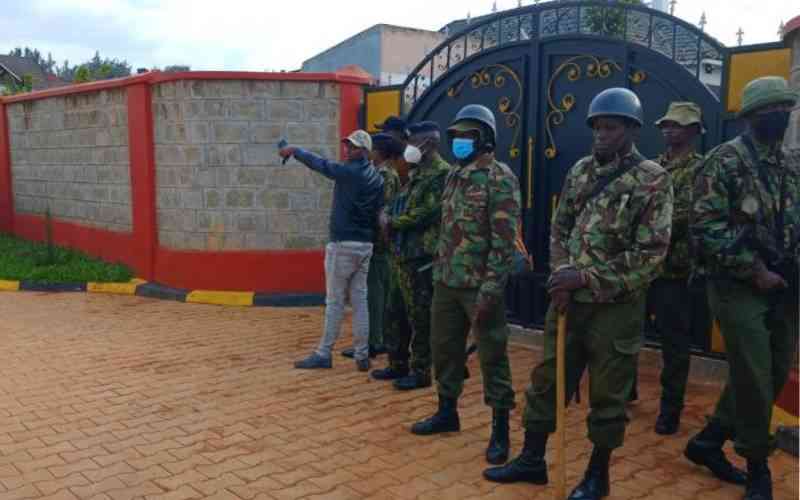Show of firepower: Why heavy security accompanied Natembeya's arrest

[Osinde Obare, Standard]
The Ethics and Anti-Corruption Commission (EACC) has defended its decision to arrest Trans Nzoia Governor George Natembeya, saying the move is part of an ongoing investigation into alleged procurement irregularities and conflict of interest.
The agency also defended the presence of heavily armed police officers, saying it was a necessary measure to ensure the safety of its personnel, not an act of intimidation.
“You can imagine what would have happened if they went alone. When we have security accompanying our officers, it’s just for purpose of ensuring their security, it’s not to intimidate anybody.
“It was meant to ensure the operation is done in a secure manner,” said EACC Director of Ethics and Leadership John Lolkoloi.
Speaking on Spice FM on Tuesday, May 20, Lolkoloi added that the operation was conducted with full legal backing.
"This was an ordinary investigation that the Commission was undertaking. EACC is an independent commission…We do our work by the law and pursuant to the complaints we receive," said Lolkoloi.
Governor Natembeya’s Monday arrest has sparked heated political debate and concern over the intersection of law enforcement and political rivalry.
Lolkoloi revealed that the Commission had obtained a court warrant before conducting search operations at his Kitale and Nairobi homes.
He called on political leaders to uphold the rule of law rather than incite supporters. "We urge leaders to be subject to the law and restrain their supporters. We cannot build a country based on lawlessness," he added.
The EACC maintains that its investigations follow a rigorous, multi-step process and are not politically motivated.
"EACC is not the final investigator. We collect documents, analyse them, and forward our reports to the Office of the Director of Public Prosecutions (ODPP), which independently determines whether there's sufficient evidence to prosecute," explained Lolkoloi. "The courts will further interrogate the evidence and witnesses."
He also dismissed claims that the arrest was politically influenced, noting that the probe into the Trans Nzoia case began long before recent political statements were made by or about the governor.
"This could have been a coincidence. The investigation did not start after those statements were made…they were already ongoing,” he added.
Stay informed. Subscribe to our newsletter
The Ethics Director clarified that although the governor had not been summoned, investigators had reason to believe there was evidence to be secured at his residence.
"It is not a political issue; it's a legal one. Some of these complaints come directly from citizens. It is our duty to pursue them to their logical conclusion."
Lolkoloi further acknowledged that some corruption cases have collapsed in court due to weak evidence or procedural issues, noting that the EACC is seeking delegated prosecution powers to improve the quality and efficiency of graft prosecutions.
"We believe that if we had the authority to prosecute some of the cases we investigate, with the DPP's concurrence, the outcomes would be better. Those who investigated the case understand the details best and can present the strongest arguments in court," he said.
As for whether the EACC targets politicians based on alignment, Lolkoloi claimed the Commission is guided purely by facts and complaints filed.
"The basis of our investigation is not whether you are aligned with the government or not, but the facts as established during the investigation. Whether it's a governor, CEC, or any public official, if the evidence is there, it will be submitted to the DPP









